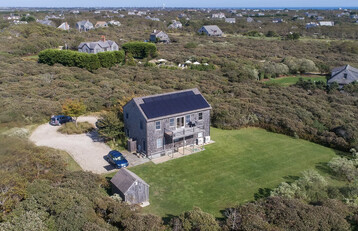Appeal Challenges HDC Authority To Regulate Rooftop Solar Installations
JohnCarl McGrady •

ACK Smart Energy, a local solar installation company, is appealing a Historic District Commission (HDC) ruling that conditioned approval for a front-facing solar panel array at 65 Polpis Road on the relocation of an existing driveway.
The appeal, which will be heard by the Select Board, alleges that the HDC lacks the authority to regulate rooftop photovoltaic solar installations.
“The HDC does not exercise aesthetic control over other visible utility infrastructure, such as utility poles, transformers, electric meters, or overhead wires. These elements often present a substantially greater and more historically incongruous visual impact than a low-profile, flush-mounted [solar] array,” the appeal reads in part. “Applying discretionary aesthetic review to one form of essential utility equipment (solar generation) while excluding others is inconsistent and legally unsound. The proposed solar array should be considered functional utility equipment vital for energy resilience, not an ‘architectural feature’ subject to discretionary aesthetic review.”
ACK Smart claims that the HDC’s jurisdiction is limited to exterior architectural features, a category that does not include solar arrays.
“We are just trying to prevent a third cable and help locals go solar and save on rising bills,” ACK Smart director of sales Tobias Glidden said.
The HDC voted unanimously in October to approve a rear-facing solar array at 65 Polpis Road and to condition the installation of the front-facing array on the relocation of a driveway and on the addition of vegetative screening to reduce the array’s visibility from the road.
“The concern is just the guidelines we've established for solar, which is avoiding the front of the main structure,” HDC member Angus MacLeod said.
HDC chair Stephen Welch objected to Glidden’s arguments about the scope of the HDC’s act.
“It seems to me that you've come in with a foregone conclusion that this would be a kind of a case study in front of the Select Board,” he said. “The act was written to preserve the historic character and setting of the island, and solar was not something that was around when the act was written.”
To find in favor of ACK Smart, the Select Board will have to determine that the HDC’s decision was arbitrary and capricious or legally defective, a high standard that is rarely met. The most recent HDC appeal to the Select Board of the HDC’s decision to permit the demolition of the old Nantucket Electric Company building on New Whale Street failed 3-2. In the aftermath of that appeal, the Select Board has begun considering revisions to the HDC appeal process that could send future appeals directly to Superior Court, bypassing the Select Board altogether.
Representatives of the HDC did not immediately return requests for comment.
ACK Smart also argues that the HDC’s tendency to block highly visible front-facing solar arrays constitutes an unauthorized prohibition that is not codified in their act or in any of their guidelines.
“Critically, there is no reference to roof orientation or any categorical prohibition of ‘front-facing’ panels in the guidelines,” the appeal states. “The Commission's decision to condition approval based solely on the front roof plane's orientation introduces an unauthorized, categorical standard that exceeds the scope of the Act.”
Welch disagrees.
“That's a long-standing practice,” he said of the HDC’s general opposition to front-facing rooftop solar arrays. “It carries as much weight as law.”
The appeal goes on to argue that solar is an important part of Nantucket’s general well-being and preservation, given the possible consequences of climate change and sea-level rise for the island and its historic structures.
“We urge the Board to affirm that promoting energy resilience and economic sustainability, when accomplished through discreet, compliant design, is consistent with the preservation goals of the Historic District Act,” the appeal concludes.